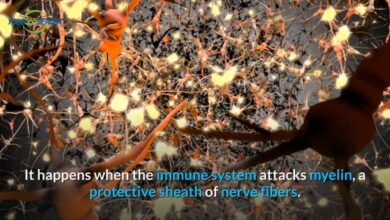By Staff Writer
COVID-19 poses severe threats to health in its duration and some grave after-effects. Patients who got better within 1-2 weeks of illness, or even those who showed no symptoms with COVID-19, can develop post-COVID-19 health issues. However, at this point, researchers are working hard to collect and analyze as much information as possible. So far, it is becoming apparent that many post-COVID-19 patients are experiencing long recovery periods and severe, long-lasting consequences.
Most-Common Symptoms
Besides some organ-specific symptoms, post-COVID-19 effects also include common health issues. These can last even after you recover fully from the infection and are antibodies positive.
Along with a lot of attention, these problems have also got some names, such as PASC (post-acute sequelae of SARS-CoV2), post-Covid syndrome, long Covid, and the people suffering these conditions are globally named Long Haulers.
The issues identified include –
- Brain fog
- Fatigue
- Headache and dizziness (especially when you stand)
- Heart palpitations
- Shortness of breath and chest pain
- Muscle pain
- Fever and cough
- Anxiety/Depression
Organ Damage
Primarily, COVID-19 is associated with lung damage. However, it can affect other organs as well.
- Lasting damage may increase the risk of heart failure. Recent studies showed almost 50% of COVID-19 patients develop heart problems.
- COVID-19 can also target kidney cells. Abnormal levels of oxygen can also cause kidneys to malfunction. Blood clots can clog kidneys. Patients with renal transplants are at a higher risk of developing a severe form of COVID-19.
- COVID-19 pneumonia can permanently damage/affect the working of the alveoli. The affected part of the lungs can also result in breathing problems.
- COVID-19’s effects on the brain include seizures, strokes, and temporary paralysis. It increases the risk of developing Parkinson’s and Alzheimer’s disease in even younger people.
- Apart from some organs getting damaged, COVID-19 can cause inflammation of organs leading to Multisystem Inflammatory Syndrome (MIS). A recent study showed it involves the heart, liver, kidneys, hematological, and nervous system and induces multiple organ failure.
- It can also lead to autoimmune dysfunction. Consequently, your immune system starts attacking your healthy body cells.
Depression & Anxiety
People who had to go through treatments like ventilators and admission to ICU can develop anxiety disorders like PTSD. Researchers witnessed a high rate of depression, anxiety, chronic fatigue syndrome, and mood swings in such patients.
How long can these effects last?
Unfortunately, the answer to this question is still unknown. Those who were the victims of the first wave but somehow managed to recover are still a year or less into their recovery.
How Do I prevent these effects?
Avoid getting infected with the COVID-19 virus. Read the advice and precautions shared with us by reliable public health officials. Your healthcare provider can address concerns and hesitancy to get vaccinated as a preventive measure. Maintain a healthy lifestyle, take appropriate action to boost your immune system, and stay optimistic with all the spiritual support and inspiration available to you.
Tags
Physical,
Mental,
Social,
Featured Topics,
Healthy Lifestyle,
Lifestyle,
COVID-19,
Post-COVID-19,
Men’s Health,
Women’s Health,
Vaccination,
By Staff Writer
COVID-19 poses severe threats to health in its duration and some grave after-effects. Patients who got better within 1-2 weeks of illness, or even those who showed no symptoms with COVID-19, can develop post-COVID-19 health issues. However, at this point, researchers are working hard to collect and analyze as much information as possible. So far, it is becoming apparent that many post-COVID-19 patients are experiencing long recovery periods and severe, long-lasting consequences.
Most-Common Symptoms
Besides some organ-specific symptoms, post-COVID-19 effects also include common health issues. These can last even after you recover fully from the infection and are antibodies positive.
Along with a lot of attention, these problems have also got some names, such as PASC (post-acute sequelae of SARS-CoV2), post-Covid syndrome, long Covid, and the people suffering these conditions are globally named Long Haulers.
The issues identified include –
- Brain fog
- Fatigue
- Headache and dizziness (especially when you stand)
- Heart palpitations
- Shortness of breath and chest pain
- Muscle pain
- Fever and cough
- Anxiety/Depression
Organ Damage
Primarily, COVID-19 is associated with lung damage. However, it can affect other organs as well.
- Lasting damage may increase the risk of heart failure. Recent studies showed almost 50% of COVID-19 patients develop heart problems.
- COVID-19 can also target kidney cells. Abnormal levels of oxygen can also cause kidneys to malfunction. Blood clots can clog kidneys. Patients with renal transplants are at a higher risk of developing a severe form of COVID-19.
- COVID-19 pneumonia can permanently damage/affect the working of the alveoli. The affected part of the lungs can also result in breathing problems.
- COVID-19’s effects on the brain include seizures, strokes, and temporary paralysis. It increases the risk of developing Parkinson’s and Alzheimer’s disease in even younger people.
- Apart from some organs getting damaged, COVID-19 can cause inflammation of organs leading to Multisystem Inflammatory Syndrome (MIS). A recent study showed it involves the heart, liver, kidneys, hematological, and nervous system and induces multiple organ failure.
- It can also lead to autoimmune dysfunction. Consequently, your immune system starts attacking your healthy body cells.
Depression & Anxiety
People who had to go through treatments like ventilators and admission to ICU can develop anxiety disorders like PTSD. Researchers witnessed a high rate of depression, anxiety, chronic fatigue syndrome, and mood swings in such patients.
How long can these effects last?
Unfortunately, the answer to this question is still unknown. Those who were the victims of the first wave but somehow managed to recover are still a year or less into their recovery.
How Do I prevent these effects?
Avoid getting infected with the COVID-19 virus. Read the advice and precautions shared with us by reliable public health officials. Your healthcare provider can address concerns and hesitancy to get vaccinated as a preventive measure. Maintain a healthy lifestyle, take appropriate action to boost your immune system, and stay optimistic with all the spiritual support and inspiration available to you.




